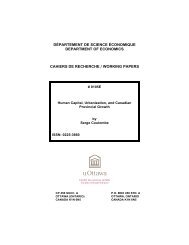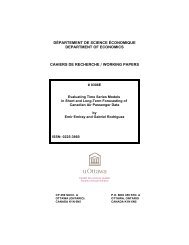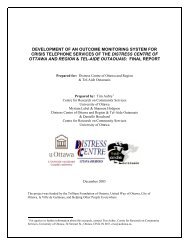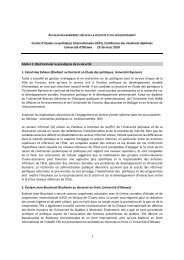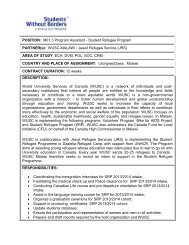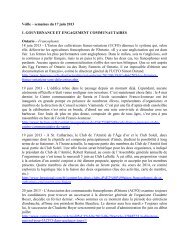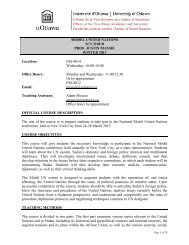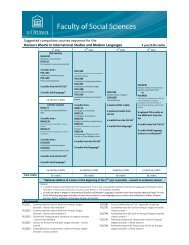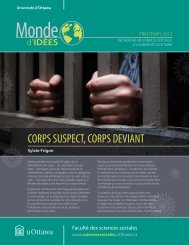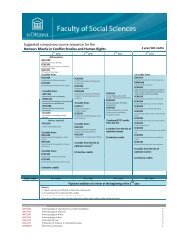Full text - Faculty of Social Sciences - Université d'Ottawa
Full text - Faculty of Social Sciences - Université d'Ottawa
Full text - Faculty of Social Sciences - Université d'Ottawa
You also want an ePaper? Increase the reach of your titles
YUMPU automatically turns print PDFs into web optimized ePapers that Google loves.
172 IPC Review 3 Strategy to Engage Regional Government in the Prevention <strong>of</strong> Violence Against Women 173<br />
to, given the resources to help themselves, and empowered to make<br />
positive decisions for themselves and the people they care for. (p. 25)<br />
In Peel Region, we have met with considerable successes in the area <strong>of</strong><br />
naming gender and introducing concepts <strong>of</strong> gender mainstreaming, though<br />
there is still much work to be done. Successes include the broadening <strong>of</strong> a<br />
gender equity approach into a multi-focal strategy that recognizes intersecting<br />
oppressions and is more inclusive. Also, there is an increasing understanding<br />
on the part <strong>of</strong> funders <strong>of</strong> the priority <strong>of</strong> addressing violence against women and<br />
<strong>of</strong> the importance <strong>of</strong> consulting with women-centred service agencies around<br />
their future funding priorities. There is a growing acknowledgement <strong>of</strong> the<br />
notions <strong>of</strong> equity and inclusion and most community initiatives have a strong<br />
“diversity” component. Lastly, initiatives such as those supported by WICI<br />
and Status <strong>of</strong> Women Canada highlight the connection between global and<br />
local advocacy efforts and provide us with rare opportunities to position our<br />
Region in the con<strong>text</strong> <strong>of</strong> international advocacy.<br />
Despite these successes, we continue to face a number <strong>of</strong> challenges in the area<br />
<strong>of</strong> naming gender and successfully applying a gender mainstreaming approach.<br />
Woman abuse and sexual violence continue to remain outside the traditional<br />
notions <strong>of</strong> crime prevention. Many victims and advocates continue to place<br />
issues <strong>of</strong> woman abuse outside <strong>of</strong> the concept <strong>of</strong> “crime” – statistics around<br />
disclosure and accessing the criminal justice system for domestic violence<br />
and sexual assault reiterate the great number <strong>of</strong> victims who do not see the<br />
criminal justice system as providing them with just, nor, acceptable solutions.<br />
While the reasons for this phenomenon are beyond the scope <strong>of</strong> this case<br />
study, the relevance to our work in Peel is that the concept <strong>of</strong> preventive work<br />
around woman abuse and sexual violence is <strong>of</strong>ten secondary to the work <strong>of</strong><br />
providing adequate and valuable service to victims who are seeking support. In<br />
an environment where waiting lists, case overload and project-based funding<br />
prevail, education, advocacy and prevention initiatives are sparse, short-term<br />
and difficult if not impossible to adequately evaluate. Where communities are<br />
fortunate enough to have community collaboration, the participants typically<br />
lack the capacity to adequately or extensively evaluate the short or long-term<br />
efficacy and effectiveness <strong>of</strong> any given initiative.<br />
Regional Government: The Ideal Site<br />
for the Prevention <strong>of</strong> Woman Abuse<br />
According to Hayes (2006), “it is at the local level and via local government<br />
that violence prevention policies and interventions may best be enacted, with<br />
municipal governments facilitating the coordination <strong>of</strong> local initiatives and<br />
supporting community initiatives” (p. 9). Gender mainstreaming approaches<br />
attempt to resource, coordinate and mainstream the many separate services<br />
that exist independently at the regional level <strong>of</strong> government (Hayes, 2006).<br />
UN-Habitat concurs that local government is a key player in strategies to<br />
fight violence against women and in making connections between women’s<br />
experiences <strong>of</strong> private and public violence.<br />
Governance includes the pivotal role <strong>of</strong> mayors and other municipal leaders<br />
in confronting increasing problems <strong>of</strong> community safety. Shaw (2001) argues<br />
that the twenty-first century will present a “huge challenge” for mayors and<br />
local government around emerging issues <strong>of</strong> urban migration, poverty, social<br />
exclusion, minority and immigrant populations, substance abuse and urban<br />
crime. Local governments are coming to view community safety as a human<br />
right and a necessary condition for full participation in civic life, and crime<br />
remains a debilitating threat to urban sustainability.<br />
The work in Peel Region highlights our success in partnering with local<br />
government around the issues <strong>of</strong> woman abuse and sexual assault. There is<br />
an ongoing commitment from PCAWA, PCSA and the Region <strong>of</strong> Peel to<br />
engage the regional leaders and the Region as the appropriate place to link<br />
all efforts to address the prevention <strong>of</strong> woman abuse. This is largely due to<br />
successes in working collaboratively with multiple sectors to engage in effective<br />
crime prevention.<br />
Challenges include the lack <strong>of</strong> a formal regional vision on crime reduction that<br />
is inclusive <strong>of</strong> a gender analysis, as well as the absence <strong>of</strong> a formalized process for<br />
the Region to engage in community consultation and to incorporate the input<br />
into operations. In addition, the community collaboratives, while formally<br />
structured, have difficulty in sustaining consistent partnerships due to a lack<br />
<strong>of</strong> funding, the turnover <strong>of</strong> leadership, changing membership, competing<br />
priorities and sometimes differing philosophies and ideologies.<br />
Financial and Ideological Support<br />
The financial sustainability <strong>of</strong> collaboratives remains tenuous and unstable.<br />
Both PCAWA and PCSA have some core funding, but they are largely influenced<br />
by external factors and the political climate <strong>of</strong> the day. This instability and the<br />
constant need to chase funding can result in staff turnover. Unfortunately, most<br />
collaboratives do not have a paid or formally structured coordinator position,<br />
and collaborative work is <strong>of</strong>ten taken on by dedicated staff as an add-on to full



